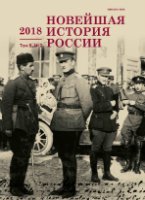«За что боролись?»: герои Гражданской войны в «угаре нэпа»
“What Have We fought For?”: The Heroes of the Civil War in “the Intoxication of the NEP”
Author(s): S. B. Ulyanova , I. V. SidorchukSubject(s): Military history, Social history, Economic policy, Corruption - Transparency - Anti-Corruption
Published by: Издательство Исторического факультета СПбГУ
Keywords: Civil war; Russia; New Economic Policy; History of leisure; Deviant leisure; Embezzlements; History of everyday life;
Summary/Abstract: The article is devoted to transformation of the social type of the hero of the Civil war in the period of the New Economic Policy. With his style of political and everyday behavior, hero glorified by propaganda, a fighter for Soviet power, in time of peace, in conditions of revival of capitalism could be transformed in a negative social type of cunning businessman and the embezzler. The military merit, by which he enjoyed the confidence and was allowed to state resources, gave possibilities to use them for their own selfish interests. In this article the social type of the hero of the Civil war is studied primarily by reference to its leisure practices often took a deviant character: drunkenness, carousing, gambling. Using methods of everyday history and its component — the history of leisure — has allowed the authors to uncover the causes of their proliferation, particularly the economic and social motivation of participants. The new Soviet bureaucrats, deprived of their own corporate cultural traditions, readily copied the leisure behavior of the Nepmen, which seemed to them a class of winners, those who truly “knows how to live beautifully”. Business contacts with private traders provoked in the bureaucracy onepivanie (“transformation to nepman”) — corruption and embezzlement, the proceeds of which were used for vulgar and hedonistic entertainment. The article describes the mechanisms of the organization of thefts and the reaction of the authorities to the “epidemic of embezzlement”, the reflection of this theme in folklore and literature of the period. The authors come to the conclusion that commitment to the coarse and unsophisticated forms of entertainment, underscoring the generation of “leather jackets” low level of culture, including culture and leisure, and is indicative of the primitivization of the social structure as a result of Civil war.
Journal: Новейшая история России
- Issue Year: 8/2018
- Issue No: 23
- Page Range: 424-440
- Page Count: 17
- Language: Russian

